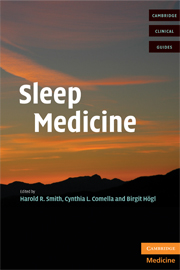Book contents
- Frontmatter
- Contents
- List of contributors
- Foreword
- SECTION 1 NORMAL SLEEP
- SECTION 2 SLEEP DISORDERS
- SECTION 3 SLEEP IN SPECIALTY AREAS
- 9 Sleep and neurologic disorders
- 10 Sleep and psychiatric disorders
- 11 Sleep and medical disorders
- 12 Sleep and pediatrics
- 13 Sleep and geriatrics
- 14 Forensic sleep medicine issues: violent parasomnias
- Index
- References
13 - Sleep and geriatrics
from SECTION 3 - SLEEP IN SPECIALTY AREAS
Published online by Cambridge University Press: 08 August 2009
- Frontmatter
- Contents
- List of contributors
- Foreword
- SECTION 1 NORMAL SLEEP
- SECTION 2 SLEEP DISORDERS
- SECTION 3 SLEEP IN SPECIALTY AREAS
- 9 Sleep and neurologic disorders
- 10 Sleep and psychiatric disorders
- 11 Sleep and medical disorders
- 12 Sleep and pediatrics
- 13 Sleep and geriatrics
- 14 Forensic sleep medicine issues: violent parasomnias
- Index
- References
Summary
Aging and its impact on sleep
While physiological sleep needs and patterns change throughout life, sleep disorders are not part of the normal aging process. As more is learned about the relationship of sleep to quality of life and conditions such as memory impairment and cardiovascular problems, it is the responsibility of healthcare providers to address sleep and its disturbances in the care of older individuals. The description of “older” is arbitrary, but it is clear that as persons age, the sleep problems they experience are different from those experienced by the younger adult population. One widely accepted paradigm defines older people to be 65 years or over. Estimates project that by 2050, 85 million Americans will be over 65. Many European countries project that at least 10% of their population will be aged 80 years or over by 2050.
The analysis of age-related changes in sleep requires the accumulation of data on a healthy population over 65 years of age. However, increased age raises the risk of cardiovascular, metabolic, cognitive, psychiatric, musculoskeletal, renal, hepatic, and hematological conditions. Therefore, it might be difficult to study a group of “healthy” individuals over 65 years of age, as it is largely the advances in medical knowledge, and the diagnostic and treatment techniques of medical conditions, that allow these individuals to grow old. The subjective experience and the physiology of sleep, as well as its electrophysiological correlates, change with age.
Keywords
- Type
- Chapter
- Information
- Sleep Medicine , pp. 224 - 239Publisher: Cambridge University PressPrint publication year: 2008

